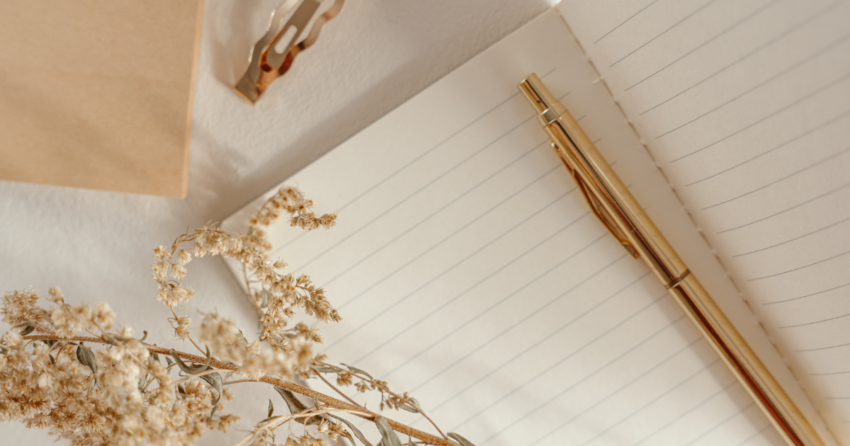Journaling Secrets Revealed: Ink Your Way to Joy

Do you feel overwhelmed by life’s demands? Journaling can help you take back control and care for your mind and heart. It’s a simple way to express yourself and change how you handle life’s ups and downs.

This guide will show you how journaling helps women’s emotional health. It can lower anxiety, help you process feelings, and boost creativity. Get ready to discover yourself, grow, and become more emotionally strong.
Key Takeaways
- Journaling can reduce the number of sick days taken off work by helping process deep thoughts and feelings.
- Gratitude journaling is an effective practice for focusing on the positive aspects of life.
- Expressive writing can lead to improved physical and mental health, including lowered blood pressure and better moods.
- Journaling can support coping with stress and reduce mental distress, preventing burnout.
- Consistent journaling (over 30 days) can provide increased mental health benefits for anxiety and depression.
The Power of Journaling for Women’s Emotional Well-being
Journaling is a strong way to help women feel better emotionally. It lets them learn more about their thoughts, feelings, and actions. This helps them understand themselves better and deal with life’s ups and downs.
Journaling as a Therapeutic Practice for Self-Discovery
Studies say journaling helps with stress and boosts confidence. It’s even used to help kids feel less sad and anxious. Writing can make people feel less depressed, anxious, and stressed from past traumas.
Promoting Self-Awareness and Emotional Intelligence
Journaling helps women know themselves better and understand their feelings. Research shows it helps people manage their feelings well. Writing about hard feelings can make you feel more anxious, but writing alone about stress can help you find support and heal.
“Journaling has been a transformative practice for me, allowing me to navigate the ups and downs of life with greater clarity and emotional resilience.” – Jane Doe, Author and Wellness Advocate
Journaling is powerful for finding out who you are, understanding yourself, and growing emotionally. It helps women grow and change in big ways.
Journaling For Women: A Safe Space for Self-Expression
Journaling gives women a special place to share their thoughts without fear. It’s a space where we can look into our deepest feelings and stories. This space helps us deal with emotions, let go of stress, and get to know ourselves better.
Studies show journaling is good for our minds. It lets us share our feelings and thoughts. This helps us deal with tough times, celebrate wins, and grow as people.
“Journaling has been a game-changer for me. It’s a place where I can be completely authentic, without fear of judgment or expectations. It’s my own private safe space to explore, reflect, and ultimately, discover more about myself.” – Jane, 35
Journaling is flexible. You can write in any way you like. Some like structured prompts, while others like blank pages. Either way, writing can lead to deep insights and change.
Journaling is a trusted friend through life’s ups and downs. It helps us know ourselves better, deal with feelings, and find our hidden potential. It’s more than just writing; it’s a way to discover ourselves and grow, letting us be our true selves.
Unleashing Creativity Through Expressive Writing
Journaling can help you tap into your creativity and hear your inner voice. It lets you express your deepest thoughts and feelings. This can open up new paths for self-discovery and personal growth.
Tapping into Your Inner Voice and Unlocking Hidden Potential
Exploring yourself can boost your creativity and make you better at solving problems. It can also make you feel more fulfilled. Just 10 minutes a day of journaling can start a habit that feeds your inner voice.
Try different journaling methods like free writing, writing what you’re thankful for, or using prompts. You could write three pages of whatever comes to mind in the morning. Or, keep a journal of what you notice each day.
Also, jot down your questions, curiosities, and sudden ideas. Keep track of the music you listen to, the art you see, or conversations you overhear. These can spark new ideas for your creative projects.
“Journaling is a profound way to connect with your present experiences and share insights for historical significance.”
To unlock your creativity with journaling, be open-minded and ready to explore. Trust your inner voice. See how your self-discovery and personal growth grow as you write.
Coping with Stress and Anxiety: Journaling for Resilience
Life is full of changes, and journaling helps women deal with stress and anxiety. Writing down thoughts and feelings makes it easier to handle stress and anxiety. It makes women more resilient and emotionally strong.
Journaling lets women unload their worries and get clear about things. It helps them respond better to stress. Studies show that writing about positive things can lower anxiety and make people feel better overall.
For women with long-term health issues, journaling is very helpful. Women with breast cancer who wrote in journals had fewer doctor visits and felt better. This shows how writing can boost physical and emotional strength.
Journaling can be about making worry lists, being thankful, or tracking how you feel. It gives a safe place for self-reflection and growth. By making journaling a calm activity, women can grow stronger through life’s tough times.
Journaling can really change things for women wanting to handle stress management, anxiety reduction, and more resilience. Writing helps women improve their emotional wellness. It helps them deal with life’s ups and downs with more clarity and strength.
Cultivating Gratitude and Positivity Through Journal Writing
Gratitude journaling is a great way for women to feel better emotionally. It helps them focus on the good things in life. This makes them happier and more content. Studies say it can make you feel less stressed and more emotionally well.
Focusing on the Bright Side: Gratitude Journaling for Happiness
Writing in a gratitude journal every day can make you feel less stressed and more happy. It makes you think more positively and less negatively. By doing this, women can learn to see the good things in life. This makes them look at things more positively.
- Gratitude journaling makes you happier and lowers inflammation in your body.
- Being thankful can lead to better mental health, even weeks after starting.
- Grateful people do kind things for others, which makes them feel better.
Being consistent with gratitude journaling is important for long-term benefits. Start by writing a few things you’re thankful for each day. Be specific to really feel the positive change in your life.
“Gratitude can improve mental and physical health by boosting optimism, reducing stress, and improving sleep quality.”
Processing Emotions: Journaling for Healing and Growth
Journaling is a safe way for women to deal with their feelings. It helps them heal and grow. By writing, they understand their feelings better, whether it’s about trauma, adversity, or daily struggles. This helps them accept themselves more, find better ways to cope, and feel stronger.
Writing Through Trauma and Adversity for Emotional Clarity
Journaling is a strong tool for emotional processing and healing. Studies show that regular journaling makes people more aware of themselves. This helps them deal with life’s tough times better.
- Using journal prompts helps people understand themselves and control their feelings.
- Daily journaling helps with life’s challenges, making better choices, and building strong relationships.
- Journaling turns past experiences into today’s feelings, helping with growth and better coping.
Writing down emotions helps women understand their feelings better. This leads to clearer emotions and the strength to get over trauma and adversity.
“Journaling can provide an opportunity to see situations more clearly after pouring out emotions into a journal.”

Journaling has many benefits, like less stress and anxiety, and better mental health. By journaling regularly, women can discover the power of healing and growth. They learn about themselves and manage their feelings better.
Building Self-Confidence with Affirmative Journaling
Our self-confidence is key to growing and succeeding as women. Sadly, 85% of Americans feel bad about themselves (Alton, 2017). But, we can take back our power with affirmative journaling.
Affirmative journaling helps us accept ourselves, celebrate our strengths, and overcome doubts. By writing positive thoughts and affirmations, we boost our self-esteem. This lets us go after our dreams with confidence.
Studies say self-esteem affects how well we do in life (Seyithan, 2019). Those with high self-esteem set big goals and keep going even when things get tough. Journaling is a great way to build this confidence, as therapists have been using it for years to help people express themselves and heal (Rowe, 2012).
To begin with, spend 10 minutes a day thinking about positive affirmations. Say these out loud and write them down to really feel them. Try using “I am” statements to focus on what you’re good at and what you dream of.
Building self-confidence is a journey, not a finish line. Be kind to yourself and get help from a therapist if you need it. With affirmative journaling, you can find self-acceptance and become the confident woman you want to be.
“Affirmative journaling is a powerful tool that allows us to cultivate self-acceptance, celebrate our strengths, and challenge any limiting beliefs that hold us back.”
Mindful Journaling: Blending Writing and Meditation
Women often juggle many tasks and care for others. It’s easy to forget about ourselves in this busy life. But, mixing journaling and meditation can help you find peace and emotional balance.
Finding Inner Peace Through Mindful Writing Practices
Mindful journaling means writing with full attention and understanding. It combines writing and meditation. This helps us think deeply, control our feelings, and find peace in busy times.
- Reflective journal writing is a simple three-step process: Begin, Write, Reflect.
- Writing for 5-10 minutes is recommended for mindful journaling sessions.
- Visualization meditations can be used to guide journal writing based on inspiration gleaned.
- The author recommends setting a timer for 5-8 minutes for writing, as it helps the brain to focus on what’s most important.
By mixing mindful journaling and meditation, we connect with our inner wisdom. This leads to better self-understanding and peace. It’s a journey that changes how we see ourselves and the world.
“Mindfulness is the art of being fully present, aware of where we are and what we’re doing, and not overly reactive or overwhelmed by what’s going on around us.” – Jon Kabat-Zinn

Let’s use the power of mindful journaling to improve our emotional health and find peace. This journey can change our lives in big ways.
Journaling For Women: A Personalized Journey
Journaling is a personal journey for women. It helps with self-discovery and emotional expression. You can use free-flowing writing or structured prompts, whatever feels right for you.
Creating your own journaling practice means finding your true voice. As you write, you’ll discover more about yourself. You’ll learn new things and deal with feelings in a safe place.
There are many types of journals to try, like classic notebooks or ones with prompts. Keep trying different styles until you find what works best. Some like writing every day, others write when they need to. Journaling fits your life in a special way.
Writing in a journal is a big part of taking care of yourself. It lets you stop, think, and feel your emotions deeply. As you write, you’ll learn more about yourself. This can lead to personal growth and better emotional health.
“Journaling has been a game-changer in my life. It’s a safe space where I can be vulnerable, explore my thoughts and feelings, and gain clarity on the things that matter most to me. I highly recommend it to any woman seeking a more personalized path to self-discovery and emotional wellness.” – Emily, 32
Start your journey with personalized journaling. It’s a way to express yourself, discover yourself, and feel better emotionally. Your journal tells your unique story. The insights you get can lead you to a more real and fulfilling life.
Conclusion: Embrace the Transformative Power of Journaling
As we end our look at journaling’s power, I urge you to welcome it into your life. Journaling helps us understand ourselves better, builds emotional strength, and boosts personal growth. It brings insights, empowerment, and peace, making emotional wellness and happiness easier to reach.
This guide showed us how journaling helps with stress, anxiety, creativity, and gratitude. By journaling often, women can face life’s ups and downs with kindness. They can celebrate their wins, big or small, and take care of themselves.
Starting your journaling journey, let go of any doubts. Let your pen be a tool for exploring yourself, expressing feelings, and making your dreams come true. With every word, discover deep insights, reach your full potential, and grow emotionally and personally.




Leave a Reply